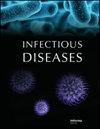Association of Raoultella bacteremia with diseases of the biliary tract.
Scandinavian Journal of Infectious Diseases
Pub Date : 2014-07-01
Epub Date: 2014-03-28
DOI:10.3109/00365548.2014.896032
引用次数: 13
Abstract
The report by De Jong et al. [1] of several cases of Raoultella bacteremia associated with biliary disease was interesting to us as we recently encountered a similar patient. A 66-y-old woman with unresectable pancreatic cancer was admitted with nausea, emesis, increasing weakness, and neutropenic fever several days after beginning her second cycle of FOLFOX chemotherapy (folinic acid, fl uorouracil, and oxaliplatin). There was no history of fl ushing or recent fi sh ingestion. Other than a temperature of 39 ° C, her physical examination (including abdominal examination) was unremarkable. Her absolute neutrophil count was 150 cells/mm 3 . An abdominal computed tomogram did not reveal abscess or air. Empiric antibiotic therapy with piperacillin – tazobactam 3.375 g intravenously every 6 h was begun. Blood cultures obtained at admission grew Raoultella ornithinolytica and Escherichia coli. Subsequent blood cultures demonstrated clearing of both organisms. Despite this apparent response to treatment of her infection, her condition continued to deteriorate and her family opted for palliative care. She died 18 days after admission. While reviewing materials related to Raoultella spp. we noted many of the same materials referenced by De Jong et al. [1]. Additionally we noted several other reported cases of bacteremia due to Raoultella spp. These are summarized in Table I [2 – 5]. As described by De Jong et al. [1], many of these cases are associated with biliary disease. Also striking to us is the possible association with malignant processes that may have involvement of the biliary and/ or pancreatic system. Bile acids have previously been shown to be tumor promoters, and increased ornithine decarboxylase activity has been noted with rapid cell proliferation [6]. The importance of the biliary system and any impact of neoplastic processes on that system and its suitability as a milieu for growth of Raoultella spp. remain to be seen.拉乌尔氏菌血症与胆道疾病的关系。
本文章由计算机程序翻译,如有差异,请以英文原文为准。
求助全文
约1分钟内获得全文
求助全文

 求助内容:
求助内容: 应助结果提醒方式:
应助结果提醒方式:


